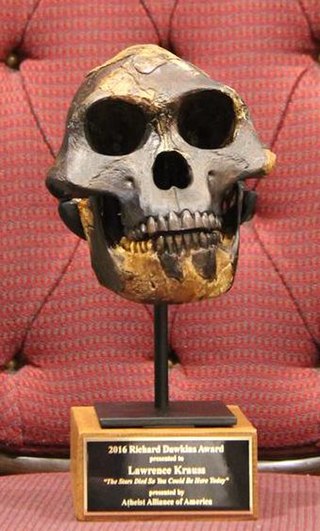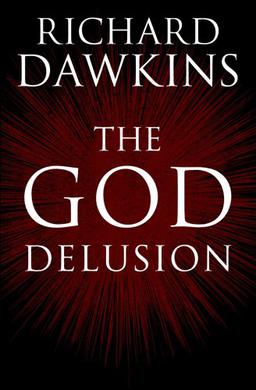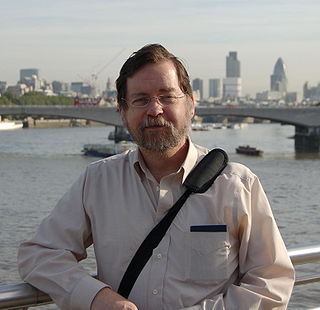
Daniel Clement Dennett III was an American philosopher and cognitive scientist. His research centered on the philosophy of mind, the philosophy of science, and the philosophy of biology, particularly as those fields relate to evolutionary biology and cognitive science.

Richard Dawkins is a British evolutionary biologist, zoologist, science communicator and author. He is an emeritus fellow of New College, Oxford, and was Professor for Public Understanding of Science in the University of Oxford from 1995 to 2008. His 1976 book The Selfish Gene popularised the gene-centred view of evolution, as well as coining the term meme. Dawkins has won several academic and writing awards.

Michael Ruse is a British-born Canadian philosopher of science who specializes in the philosophy of biology and works on the relationship between science and religion, the creation–evolution controversy, and the demarcation problem within science. Ruse currently teaches at Florida State University.

The Richard Dawkins Award is an annual prize awarded by the Center for Inquiry (CFI). It was established in 2003 and was initially awarded by the Atheist Alliance of America coordinating with Richard Dawkins and the Richard Dawkins Foundation for Reason and Science. In 2019, the award was formally moved to CFI. CFI is a US nonprofit organization that variously claims on its website to promote reason, science, freedom of inquiry, and humanist values, or science, reason, and secular values. The award was initially presented by the Atheist Alliance of America to honor an "outstanding atheist", who taught or advocated scientific knowledge and acceptance of nontheism, and raised public awareness. The award is currently presented by the Center for Inquiry to an individual associated with science, scholarship, education, or entertainment, and who "publicly proclaims the values of secularism and rationalism, upholding scientific truth wherever it may lead." They state that the recipient must be approved by Dawkins himself.

The Center for Inquiry (CFI) is a U.S. nonprofit organization that works to mitigate belief in pseudoscience and the paranormal and to fight the influence of religion in government.

John F. Haught is an American theologian. He is a Distinguished Research Professor at Georgetown University. He specializes in Roman Catholic systematic theology, with a particular interest in issues pertaining to physical cosmology, evolutionary biology, geology, and Christianity.
Criticism of atheism is criticism of the concepts, validity, or impact of atheism, including associated political and social implications. Criticisms include positions based on the history of science, philosophical and logical criticisms, findings in both the natural and social sciences, theistic apologetic arguments, arguments pertaining to ethics and morality, the effects of atheism on the individual, or the assumptions that underpin atheism.

The God Delusion is a 2006 book by British evolutionary biologist and ethologist Richard Dawkins. In The God Delusion, Dawkins contends that a supernatural creator, God, almost certainly does not exist, and that belief in a personal god qualifies as a delusion, which he defines as a persistent false belief held in the face of strong contradictory evidence. He is sympathetic to Robert Pirsig's statement in Lila (1991) that "when one person suffers from a delusion it is called insanity. When many people suffer from a delusion it is called religion." In the book, Dawkins explores the relationship between religion and morality, providing examples that discuss the possibility of morality existing independently of religion and suggesting alternative explanations for the origins of both religion and morality.

Dawkins' God: Genes, Memes, and the Meaning of Life is a book by Alister McGrath, a theologian who is currently Professor of Historical Theology at Oxford University. The book, published in 2004, with a second edition in 2015, aims to refute claims about religion made by another well-known professor at Oxford, Richard Dawkins. McGrath's book does not seek to demonstrate how Dawkins’ claims differ from Christianity, rather, it argues that Dawkins' arguments fall far short of the logical and evidence-based reasoning that Dawkins himself espouses.

The Richard Dawkins Foundation for Reason and Science is a division of Center for Inquiry (CFI) founded by British biologist Richard Dawkins in 2006 to promote scientific literacy and secularism.

Jerry Allen Coyne is an American biologist and skeptic known for his work on speciation and his commentary on intelligent design. A professor emeritus at the University of Chicago in the Department of Ecology and Evolution, he has published numerous papers on the theory of evolution. His concentration is speciation and ecological and evolutionary genetics, particularly as they involve the fruit fly, Drosophila. In 2023 he became a fellow with the Committee for Skeptical Inquiry.
The evolutionary psychology of religion is the study of religious belief using evolutionary psychology principles. It is one approach to the psychology of religion. As with all other organs and organ functions, the brain's functional structure is argued to have a genetic basis, and is therefore subject to the effects of natural selection and evolution. Evolutionary psychologists seek to understand cognitive processes, religion in this case, by understanding the survival and reproductive functions they might serve.

Paul Zachary Myers is an American biologist who founded and writes the Pharyngula science blog. He is associate professor of biology at the University of Minnesota Morris (UMM) where he works in the field of developmental biology. He is a critic of intelligent design, the creationist movement, and other pseudoscientific concepts.

Dennis S. Charney is an American biological psychiatrist and researcher, with expertise in the neurobiology and treatment of mood and anxiety disorders. He is the author of Neurobiology of Mental Illness, The Physician's Guide to Depression and Bipolar Disorders and Molecular Biology for the Clinician, as well as the author of over 600 original papers and chapters. In 2022, he was listed #49 on Research.com's "Top Medicine Scientists in the United States," with an h-index of 218 with 173,960 citations across 887 publications. Charney is known for demonstrating that ketamine is effective for treating depression. Ketamine's use as a rapidly-acting anti-depressant is recognized as a breakthrough treatment in mental illness.
The term New Atheism describes the positions of some atheist academics, writers, scientists, and philosophers of the 20th and 21st centuries. New Atheism advocates the view that superstition, religion, and irrationalism should not be tolerated. Instead, they advocate the antitheist view that the various forms of theism should be criticised, countered, examined, and challenged by rational argument, especially when they exert strong influence on the broader society, such as in government, education, and politics. Critics have characterised New Atheism as "secular fundamentalism" or "fundamentalist atheism". Major figures of New Atheism include Richard Dawkins, Sam Harris, Christopher Hitchens, and Daniel Dennett, collectively referred to as the "Four Horsemen" of the movement.
Pitchstone Publishing is a publishing company based in Durham, North Carolina. Founded by Kurt Volkan in 2003, Pitchstone Publishing has published numerous books by leading academics and scholars, particularly in the fields of secular humanism, new atheism, applied psychiatry, and psychoanalysis.

The Magic of Reality: How We Know What's Really True is a 2011 book by the British biologist Richard Dawkins, with illustrations by Dave McKean. The book was released on 15 September 2011 in the United Kingdom, and on 4 October 2011 in the United States.
The following outline is provided as an overview of and topical guide to psychiatry:
Evolutionary psychiatry, also known as Darwinian psychiatry, is a theoretical approach to psychiatry that aims to explain psychiatric disorders in evolutionary terms. As a branch of the field of evolutionary medicine, it is distinct from the medical practice of psychiatry in its emphasis on providing scientific explanations rather than treatments for mental disorder. This often concerns questions of ultimate causation. For example, psychiatric genetics may discover genes associated with mental disorders, but evolutionary psychiatry asks why those genes persist in the population. Other core questions in evolutionary psychiatry are why heritable mental disorders are so common how to distinguish mental function and dysfunction, and whether certain forms of suffering conveyed an adaptive advantage. Disorders commonly considered are depression, anxiety, schizophrenia, autism, eating disorders, and others. Key explanatory concepts are of evolutionary mismatch and the fact that evolution is guided by reproductive success rather than health or wellbeing. Rather than providing an alternative account of the cause of mental disorder, evolutionary psychiatry seeks to integrate findings from traditional schools of psychology and psychiatry such as social psychology, behaviourism, biological psychiatry and psychoanalysis into a holistic account related to evolutionary biology. In this sense, it aims to meet the criteria of a Kuhnian paradigm shift.
Augustus John Rush is an internationally renowned psychiatrist. He is a professor emeritus in Duke-NUS Medical School at the National University of Singapore (NUS), and adjunct professor of psychiatry and behavioral sciences at Duke University School of Medicine. He has authored and edited more than 10 books, and over 600 scientific journal articles that are largely focused on the diagnosis and treatment of depressive and bipolar disorders.












